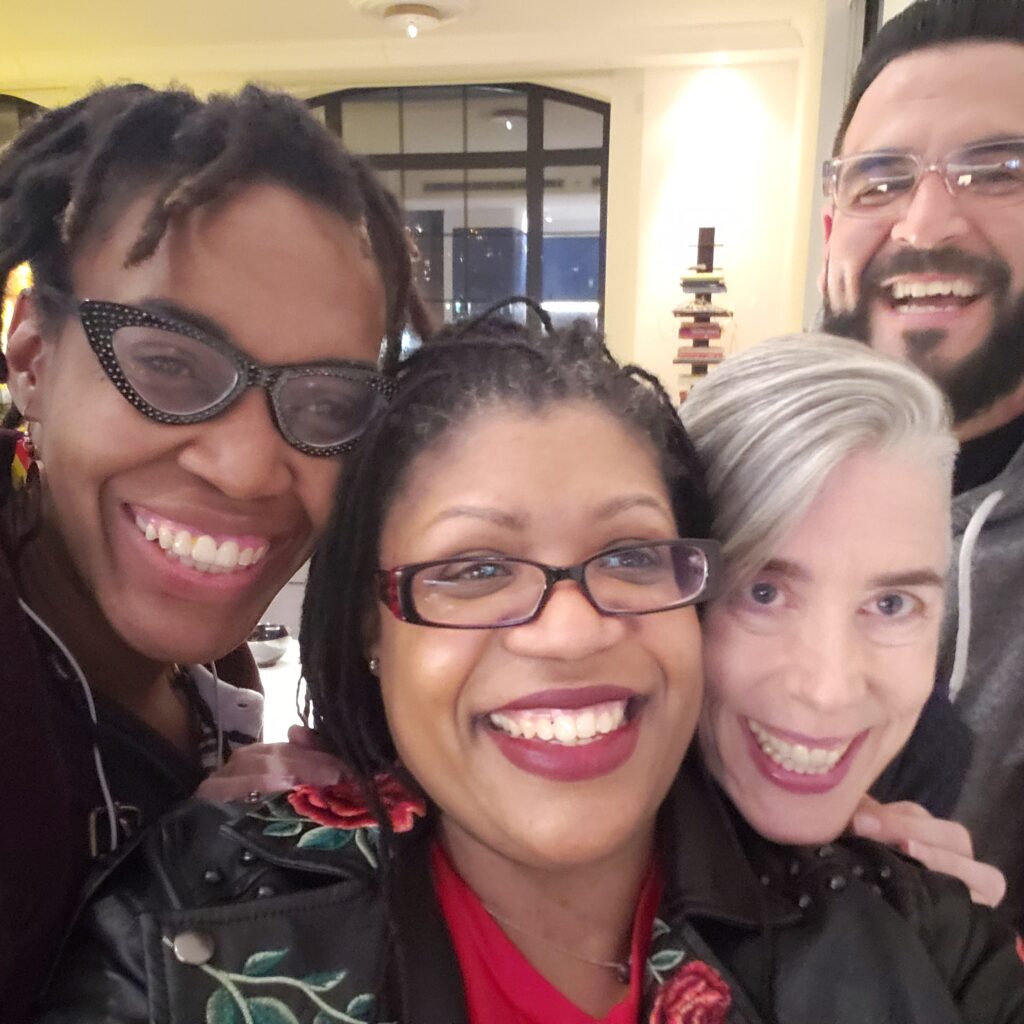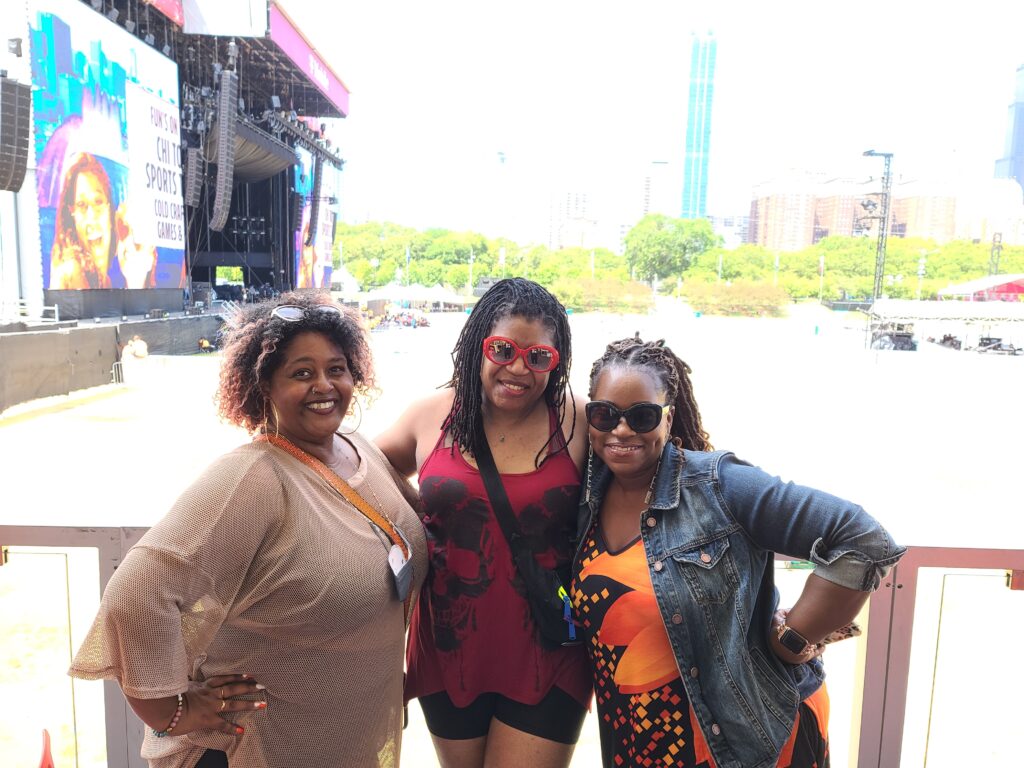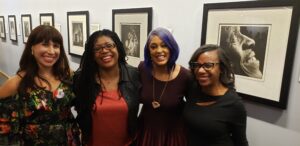Project BFF sat down with writer Mikki Kendall to talk about the friendships in her life.
Project BFF: Tell us a memorable experience with a friend when you were younger. Why has that always stuck with you?
Mikki: I used to be one of those very naïve, “my grandmother kept me close to home” kind of girls. I was a pleaser – because of family experience, I was always one of those girls who was trying to make everyone Not Fight. I was about 14 and at a daytime party at a friend’s house, and her parents weren’t home. There was a guy who was really trying to kind of push up on me, and a girl who was probably only five minutes older than me, literally two years at most, said to him, “Stay away from her.”
I was already drunk, and this guy had been trying to give me a drink, and she was really casual, but she was pissed at this guy trying to push up on a younger girl and make her drink. At first, I couldn’t figure out why she was so aggressive. Finally, to avoid it turning into a fight, I take a sip. It tastes like shit; it was the worst thing. And she looked at me: “Why are you trying to drink that?” I said, “So you wouldn’t fight.” She said, “It’s not your job to keep us from fighting.”
It sank into the back of my brain somewhere and germinated as my life policy going forward. I wish more girls and more girls, and their friends were really talking about this kind of thing. It is not your job to make everybody else get along. Looking back, it’s clear she probably saved me from several bad things in the moment. I’m not even sure she knew what those were – we were young enough that neither one of us really knew the full scope of what could happen. She just knew this guy was being a creep; and she wasn’t a pleaser. She was like: You’re not gonna do this creepy thing, go away.
And we were not close friends. We were, at best, frenemies. We’d gone to the same schools and knew the same people, but we weren’t that kind of friend. She was definitely kind of a mean girl, but I’ll be honest, as an adult looking back, mean girls saved my life. They taught me how to stop looking like such a dork, because my grandmother dressed me, and taught me the life skills necessary to be say, No, I’m not going along with this.
Project BFF: Do you feel like you have a best friend(s)?
Mikki: I don’t have a singular best friend, but through different stages of my life I’ve collected several really close friends, who I’ve been friends with for long enough that we have an agreement not to tell people how long we’ve known each other. I’ve been really lucky. I have the version of friends that’s “found family,” where we have known each other through babies and illnesses and relationships and all kind of stuff. And we have a group chat that we have had for so long it predates Google chat.
(Bonus: they have all been largely friendly with each other.)
I would say that they’re my best friends because we are each other’s voice of reason, we are each other’s cheer leading gallery sometimes we’re each other’s peanut gallery. Sometimes we are Statler and Waldorf for each other. They’re the people who will tell you when you’re right and when you’re wrong.

Project BFF: How do your friends feel about your mission/career?
Mikki: I am really fortunate in that I generally have a group of friends who are happy doing what they do even if it’s not what I do. So many of my friends have suffered with me through rewrites – there are stages of the book process where I personally hate every word I’ve ever written and no longer want to look at it, and my friends are the people who say, “No, you have to do the thing.”
Or, because I am an inveterate over worker, I will over-schedule myself, and they’ll be the ones reminding me: “Hey, get some food.” “Take a nap.” “Say no to this.” “What the hell are you doing?” And we do that for each other. We all have relatively good but demanding careers – one’s a professor, one is a journalist – and are equally likely to work too much, so we try to keep each other from setting the house on fire.
Project BFF: Have you ever struggled with friendships?
Mikki: Yes. I decided to overhaul my life relatively drastically in my early 20s. I had two friends that I’d known in high school, and in the military. I was the first one to decide to step off the this-relationship-is-bad-for-me train. Some of this is definitely me; I decided (probably relatively abruptly for other people) that none of this shit was working for me, and now I’ve gotta reshape to my life.
I have a perhaps odd relationship with the idea that I must put up with other people’s crap; the flip side of those pleaser instincts from my youth is that once I decide I’m no longer putting up with your crap, then I mean that. One of my friends and I had entered relationships with toxic men around the same time. When I decided to leave, I also became pretty vocal about how much I couldn’t stand her on-again-off-again husband – partly my momentum in getting out of a terrible relationship, but also partly that I couldn’t watch the show anymore and keep my mouth shut, and that was my fault. She was having a really hard time seeing me leave, and when it was clear I wasn’t going back to a bad relationship – especially after I met the guy who’s now my husband – there was a lot of strain on both sides. She was having, I think, a hard time seeing me change the framework of my life, and I was trying to direct her, and sometimes that’s not sustainable – when you can’t handle hearing about someone else’s life for whatever reason, that’s often the end of a friendship.
With my other friend, I think it was an issue with focus. When I decided to go back to school, she was in back in school at the same time. I finished in four years: I had picked a major; I’m gonna do this thing, if I had to go to school in the summer then I would, this thing was getting done. She was having a harder time and I probably should have been more sympathetic. I wasn’t really paying attention; I thought we were both just going to school. Our paths diverged as a result of choices, and as our paths diverged, it got harder for us to connect in the same way without resentment. I can be someone unsympathetic in that way, I’m not gonna tell you that I was perfectly behaved in this because I’m not the hero of this story. I was just somebody who didn’t have the space to nurture this through whatever was going on. I didn’t have the tools I learned later, and I lost a friend that way.

Project BFF: If you could tell your friends one thing that you wish they knew about you, what would it be?
Mikki: I would probably tell them I’m not as confident as I look. I think sometimes people get the impression that I absolutely know what I’m doing before I do it. Because once I make a decision, I commit I’ve made the decision now and I’m going. I’m not necessarily certain is going to work out. It’s just what I want to do. It’s not quite flying by the seat of my pants, but it’s not like I inevitably know what I’m doing and I am controlled and confident when I set out. I’ve just figured out to keep going. I don’t spend a lot of time thinking about would’ve, should’ve, could’ve because it doesn’t do any good, but if there’s anything my friends should know about me, it’s that even though I’ve committed to a path I’m on, I still need the company.
Project BFF: If you could be friends with one historical (no longer living) or fictional woman, who would that be?
Mikki: There are a whole group of writers and artists I would love to have known – imagine being friends with Josephine Baker! But I would love to be able to sit down and talk to Ida B. Wells-Barnett about what she did and how she did it. How in the face of life-ending threats was just like, “No, this is what I’m doing.”
I’m not going to say any of us is safe now – obviously – but I think a lot about the time in which she lived and how much more safety I have in comparison. There are people who have said they are going to lynch me, and I’m still going to keep publishing, but even the threat casts a shadow. I want to talk with Ida B. Wells-Barnett, who worked in a time when lynching – and worse – was common, about how she kept to her path when it must have been so daunting.
Project BFF: If you could be friends with one famous woman (alive now), who would that be?
Mikki: Rihanna. Her lack of giving a dam about what people think of her. I really admire that decision that she’s making. It’s not necessarily the career choices that people think she should have or want her to have. But she’s made up her mind. Forward, she goes.
You may have noticed a theme in what I like about these women. I think sometimes we tell girls and women that they must fit in a box. And then that box sucks, by the way. Even if you fit in the box, it may not work out. We can just skip the box.
Project BFF: What advice would you give your 12-year-old self about making friends throughout your life?
Mikki: I would tell 15-year-old me, specifically, that being liked is not enough. You have to like the people who like you. It is not enough to feel that this person likes me and therefore, this is fine. Around that age I was still super into trying to be comfortable around people and cool. But also, looking back there are several people in my world at the time, where I’m thinking, I don’t even like you. You are actually an awful person. Maybe I shouldn’t have done that.
Project BFF: What are your final thoughts on friendship?
Mikki: Sometimes friendship isn’t nice – sometimes it’s being the loudmouth at the party who’s starting a fight with the creep and also with you – but it should be kind. If someone doesn’t wish you well, wish good things for you, they are not your friend. You’re not obligated to try to coax a disinterested person into being a good friend. It is okay to think, “Maybe we should just cut this off.” We prune plants for their health, and sometimes the same method works for friendships.
About Mikki
Mikki Kendall is a writer, diversity consultant, and occasional feminist; she has appeared on the BBC, NPR, The Daily Show, PBS, Good Morning America, MSNBC, Al Jazeera, WBEZ, and Showtime, and discusses race, feminism, police violence, tech, and pop culture at institutions and universities across the country. She is the author of the New York Times-bestselling HOOD FEMINISM (recipient of the Chicago Review of Books Award and named a best book of the year by BBC, Bustle, and TIME). She is also the author of AMAZONS, ABOLITIONISTS, AND ACTIVISTS, a graphic novel illustrated by A. D’Amico. Her essays can be found at TIME, the New York Times, The Guardian, the Washington Post, Essence, Vogue, The Boston Globe, NBC, and a host of other sites. You can find her at www.mikkikendall.com and follow her on Twitter.

